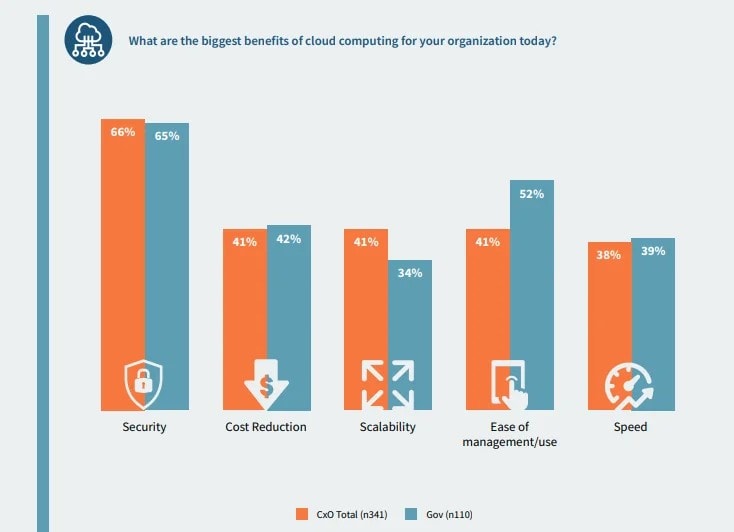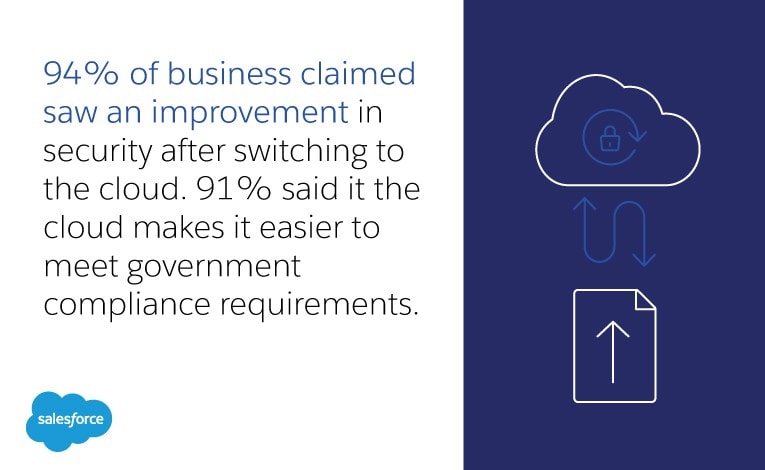It’s no secret that businesses are struggling with overwhelming amounts of data, complex operational requirements, and escalating costs in managing their IT infrastructure.
The digital era demands agility, scalability, and efficiency, and cloud computing has emerged as the indispensable tool that empowers businesses to meet these demands head-on.
To put things into perspective, Cybersecurity Ventures, in Arcserve’s Data Attack Surface Report, projects that 100 zettabytes of data will be stored in the cloud by 2025.
| Cloud computing is the answer to many of the headaches modern businesses face daily, says Nahjee Maybin, CEO of Kenyatta Computer Services. |
In this blog, we’ll uncover why cloud computing is important for businesses in 2023 and beyond and how embracing the cloud isn’t just a trend but a necessity for growth and efficiency.
The Importance of Cloud Computing For Business Growth
1. Cost Savings
At the forefront of the benefits of cloud computing is the substantial reduction in expenses. In fact, cost-effectiveness is one of the biggest reasons why cloud computing is important for business. That’s why small and medium businesses find it 40% more cost-effective to employ third-party cloud platforms than maintain an in-house system
No longer do businesses find themselves buried under the financial burden of investing in costly physical hardware or sprawling data centers.
By tapping into cloud services, there’s a fundamental shift wherein they only pay for the exact resources they utilize. This model not only cuts down upfront costs but also reduces operational expenses, leading to impressive long-term savings.

Source: CloudZero
2. Flexibility with Internet Connection
The beauty of the cloud lies in its accessibility. With a simple internet connection, businesses can reach into a vast reservoir of resources stored in the cloud.
This unparalleled flexibility ensures uninterrupted business operations, allowing teams to access vital data and applications from virtually any location at any time, ensuring robust business continuity.
3. Disaster Recovery
The unpredictability of disasters demands a robust response strategy. Fortunately, with cloud computing services, built-in disaster recovery solutions come as a standard.
Essential data isn’t merely stored but is frequently mirrored across multiple cloud environments. This redundancy ensures that, in the event of any unforeseen calamity, data recovery is swift and seamless, minimizing potential downtime and losses.
Unsure About Your Cloud Strategy?
Rely on Kenyatta Computer Services’ 33 years of expertise to craft the perfect cloud solution for your enterprise.
4. Enhanced Data Storage Capabilities
In an age where data is gold, the importance of cloud computing shines brightest in its large data storage capabilities. Businesses can effortlessly scale their storage requirements, adapting to their ever-evolving needs. In fact, 48% of corporate data is now stored in the cloud.
This scalability eradicates the need to invest in physical storage devices, ensuring data handling is both cost-effective and efficient.
5. Automatic Software Updates
The digital landscape is ever-changing, making software maintenance a relentless task. However, cloud providers have taken this challenge head-on.
They shoulder the responsibility of rolling out software updates, ensuring that businesses always operate with the latest, most secure versions of applications, freeing them from the tedium of manual updates.
6. Types of Cloud Catered to Needs
The types of cloud solutions available today are as diverse as business needs.
Whether it’s a public cloud for broad scalability, a private cloud for enhanced security, or a hybrid blend of the two, businesses can pinpoint and choose the cloud environment that aligns seamlessly with their operational and security prerequisites. Additionally, there are three main cloud service models: SaaS, PaaS, and IaaS.
| Model Type | Model Name | Key Features | Ideal For |
| Deployment | Public Cloud | Resources owned and operated by third-party providers | Startups, projects with fluctuating workloads |
| Deployment | Private Cloud | Resources used exclusively by a single organization | Financial institutions, large enterprises with sensitive data |
| Deployment | Hybrid Cloud | Combines public and private clouds | Organizations needing flexibility & enhanced security |
| Deployment | Community Cloud | Shared by several organizations with common concerns | Research institutions, government agencies sharing similar needs |
| Service | SaaS (Software as a Service) | On-demand software via the internet | Businesses needing applications without dealing with underlying infrastructure |
| Service | PaaS (Platform as a Service) | Environment for developing, testing, & deploying apps | Developers aiming for streamlined application development & deployment |
| Service | IaaS (Infrastructure as a Service) | Virtualized computing resources over the internet | Businesses looking for a flexible, scalable, and cost-effective IT infrastructure |
7. Reduced Carbon Footprint
As global consciousness shifts towards sustainability, businesses seek ways to minimize their environmental impact. By harnessing cloud resources, there’s a significant reduction in the dependence on physical hardware and software.
This shift not only trims operational costs but also notably decreases a company’s carbon footprint, marking a win for both business and the environment.
8. No Need for In-house IT Infrastructure
The logistical and financial challenges tied to maintaining a full-fledged in-house IT infrastructure can be daunting. The cloud offers a big relief.
From raw computing resources to the latest software suites, businesses can source everything they need from the cloud infrastructure, ensuring agility, reduced costs, and optimal efficiency.
9. Improved DevOps
Integrating cloud computing with DevOps practices presents a transformative approach to software development and operations. With the cloud, DevOps teams benefit from streamlined workflows, fostering faster iterations and more efficient deployments.
This amalgamation ensures an environment where continuous integration, testing, and delivery happen seamlessly. By leveraging cloud environments, DevOps can effectively reduce the time-to-market, enhance application quality, and boost collaboration across teams, thus driving innovation at an accelerated pace.
10. Improved Compliance & Security
In today’s digital age, ensuring robust safety measures and strict adherence to regulatory standards is crucial. Data centers managed by cloud providers are equipped with advanced security measures.
Additionally, cloud computing services prioritize compliance with both industry-specific regulations and international data protection mandates.

Source: Salesforce
This is because the data stored in the cloud is shielded with strong encryption techniques, and regular audits ensure businesses adhere to necessary regulations, ensuring both data integrity and regulatory compliance.
Concerned About Cloud Security and Support?
As a Microsoft Gold Partner, our team ensures your cloud operations remain seamless and secure.
11. Scalability and Performance
One of the hallmarks of cloud infrastructure is its inherent scalability. Businesses no longer remain tethered to static resources.
They can dynamically scale up or down based on real-time requirements, all while ensuring peak performance without the dread of resource wastage.
12. Always Evolving
The dynamism of the cloud technology landscape is why cloud computing is important for businesses. As the technology frontier expands, cloud platforms continually evolve, equipped with the latest features and innovations.
Businesses, in turn, can harness these advancements, ensuring they remain at the forefront without the hassle of overhauling their existing systems.
13. Shift from CAPEX to OPEX
The financial framework of businesses undergoes a transformative shift with cloud computing.
Instead of hefty capital expenditure (CAPEX) on tangible assets, companies transition to a more fluid operational expenditure (OPEX) model centred on cloud services. This transition offers better financial manageability, transparency, and predictability in the long run.
Where to Start When Considering Cloud Adoption?
Are you confused about where to begin with cloud adoption? This table simplifies the first step for businesses venturing into the world of cloud computing.
By highlighting the distinctive features of each leading cloud service provider, it aids organizations in identifying which platform might best cater to their unique requirements, facilitating a smoother transition to the cloud.
| Cloud Service Provider | Key Offerings | Suitable For |
| Amazon Web Services (AWS) | Data storage, computing resources, DevOps tools | Large enterprises, startups, e-commerce |
| Microsoft Azure | AI services, data centers, software updates | Enterprises, apps with Microsoft integration |
| Google Cloud Platform | Data analytics, open cloud, scalable infrastructure | Data analytics, machine learning, open-source projects |
| IBM Cloud | Hybrid cloud, AI-driven insights, cloud environments | Companies seeking AI solutions, hybrid deployments |
| Oracle Cloud | Disaster recovery, cloud infrastructure, data storage | Databases, enterprise applications |
Leverage the Power of the Cloud with Kenyatta Computer Services
In an era where IT complexities can hinder business growth, the importance of cloud computing cannot be stressed enough. Which is it’s essential to have a partner who understands your unique challenges.
Kenyatta Computer Services, with its comprehensive range of IT solutions, stands as a pillar for businesses navigating the intricate maze of technology outside the confines of data centers. Our certified experts don’t just offer support; they partner with you.
| Explore our range of IT services in Denver:
|
Whether it’s networking, hardware, or application management, we ensure a seamless IT environment tailored to your unique business demands.
As the digital landscape continues to evolve, entrust your cloud computing journey to KCS, where we prioritize your success every step of the way. Get in touch with us today.


